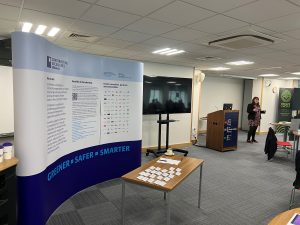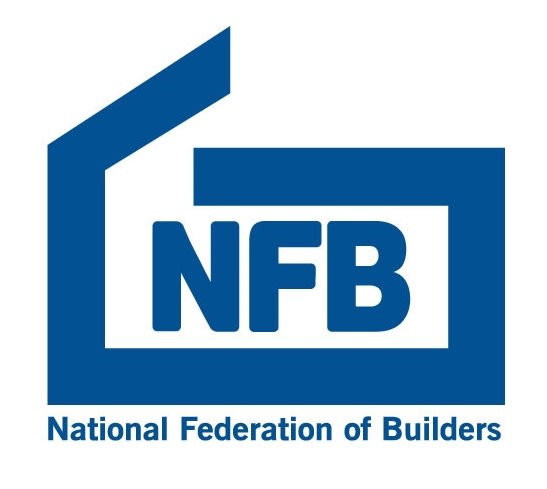CE Midlands CEO has been crowned the winner of an incredible regional property and construction award.
Andrew Carpenter has been voted the Property Personality of the Year at the 2022 South West Property Awards.
Returning for the fifteenth consecutive year, the awards recognise outstanding achievements of the people, businesses and organisations which have played a vital role in the design and development of the built environment in the South West region.
Since joining the construction sector 45 years ago, Andrew has worked tirelessly and was selected for his contribution during Covid-19 and beyond where he created opportunities for construction professionals across the South West to regularly collaborate via webinars, dinners or debates.
“I can’t quite believe that I was voted the South West Property Personality of the Year,” comments Andrew.
“At Constructing Excellence South West we’re passionate about supporting the industry and wanted to make sure we continued to engage with our members throughout the pandemic. So, we designed and launched a brand-new weekly webinar series covering a wide range of industry topics to keep people informed and consulted.
“It’s fantastic to win this award and I’m incredibly proud to have been nominated by the judges and chosen by the ballot.”
Constructing Excellence South West is a member-led organisation created to drive the change agenda in construction across the South West region. It exists to improve industry performance to produce a better-built environment and operates for the good of the construction industry and its stakeholders.
CE Midlands would like to congratulate our first cohort of successful graduates of the CE Midland’s Diploma in Collaboration in Construction.
The certificates were presented to the following graduates at UKCW 2022 in Birmingham last month:
Andrew Clayton, Darren Wallace, Jamie Conde, Joe O’Boyle, Kelly Humphries, Kubra Sari, Matt Moe, Richard Vickers, Steve Hunter, Ele George and Rob Faro
Next year’s Diploma starts in January 2023, you can download the prospectus here.
The Diploma is a ten month online course on one half day a month followed by additional reading material and homework
Ele George, one of this year’s graduates said “I would highly recommend this diploma people working across all specialisms in the industry. The course has been a great way to understand from a board range of construction professionals how and why we must adopt new approaches in construction. From writing a project brief to setting a company vision, the key learning is that collaboration and early engagement are essential if we want to share the risk but also share the reward.”
With grateful thanks to Nick Pettit, it was a great pleasure to launch our newest Best Practice Club at Lincoln College on Tuesday 25th October 2022.
Sixty professionals from across the county of Lincolnshire came together to hear Andrew Carpenter speak about the benefits of joining CE Midlands and the need for a Lincolnshire Club.
In addition, Andrew took the audience through the CLC Construct Zero Performance Framework, outlining the UK’s construction sector roadmap to achieving Net Zero by 2050 by identifying the required metrics and milestones.

The next move is to create a working committee for the Lincolnshire Club, and this will take place at a Leadership Dinner at the Doubletree by Hilton Hotel in Lincoln on the evening of 1st December 2022. Anybody interested in joining the committee and attending the dinner should contact Lynn.broughton@cemidlands.org.
In a statement of the bleeding obvious, the planet, the country and construction are facing great uncertainties and major challenges on several fronts. Assembling a cluster of policies and strategies to get us out of the current political and economic malaise to a more inclusive and fairer, net-zero economy will need ambitious and innovative missions that transform the entire economy. As Martyn Jones argues this month, it will require a fundamental pivot away from “business as usual” within the current technological-economic-societal-legal-environmental paradigm.
With much of the world facing climate, health, energy, inequality and cost-of-living challenges, leaders have an opportunity – indeed an obligation – to articulate a meaningful alternative to current policymaking. This will require conveying bold and coherent visions and missions to achieve more sustainable and equitable growth.
We need a progressive and inspirational economic agenda to transform the entire economy embracing all aspects of our lives including how we build, what we eat, our energy sources and how we get around. This will generate a real “green new deal” founded on sustainable and inclusive growth, with governments working with industry to set the direction of our journey and crowd ideas and investment, rather than cleaning up the messes left by bad policies and harmful business practices.
What will be the key drivers and strategies of the new “green and inclusive” paradigm? Several publications by CESW and other thought leaders are already showing our direction of travel, starting with recognising the need for a clear break from the thinking that has shaped our policies and practices in the past. That thinking needs to be replaced by a new positive narrative setting out the future with a fundamental reassessment of our core values (including integrity, reliability, honesty, courage, loyalty, concern for others) and how value is created.
Like the rest of the economy, construction needs a new, comprehensive, inclusive, equitable, and sustainable agenda for change. This of course will require innovation, without which solutions to problems – be it a pandemic, climate change, or inequalities – will remain beyond our reach.
This – to coin a phrase – rethinking construction is already underway as in recent years the limitations of our current paradigm and ways of working have become more and more apparent. And there are solutions emerging too. For example, the Value Toolkit: a government-backed initiative designed to change the way we in construction, and particularly clients, think about and measure value. It enables the kind of value-based decision making needed to drive better societal, environmental, and economic outcomes, and improve our industry’s legacy for future generations.
And then there are publications by CESW including the recently to be launched guide website, ‘The enlightened client’s journey to project quality and compliance’, and its 6 Ps (Purpose, People, Procurement, Product, Process, and Performance) that offers a dynamic, organic, and evolving framework for clients and their advisers to re-evaluate what they value in their organisations and projects and how they can work more effectively with the industry to deliver the transformative project outcomes that are needed.
We can also look to the theories and empirical evidence of technological and economic change for some insights into the likely shape of the emerging paradigm. From an analysis of previous techno-economic shifts we can anticipate that there will be key factor industries offering abundant supply at rapidly descending price.
Then there are main carrier branches (infrastructure has been a major carrier in previous paradigm shifts), and induced growth sectors in the new economy. And other growth sectors growing rapidly from a small base. A new skill profile affecting both quality and quantity of labour and corresponding patterns of income distribution. A new pattern in the location of national and international investment. And there will be changes too in regulatory regimes and features of our national system of innovation.
And of particular interest to Constructing Excellence, new best practices in the way in which firms are organised and the emergence of new forms of cooperation and competition.
Who will lead the transformation? Britain, France, and Belgium led the explosive surge of interrelated innovations associated with the First techno-economic paradigm. The USA, Japan and Germany were at the forefront of the Fifth. Will Britain, construction and the South West be amongst the leaders in shaping the Sixth paradigm?
Well, it’s very nearly the end of another challenging year in construction, a Fire Safety Act is in force , an industry changing Building Safety Act gained Royal Assent and is going to mount enormous challenges in terms of regulatory control, competency expectations for many and threats of hefty fines or imprisonment for breaching the Building Safety Act and a returning Secretary of State under our new Prime Minister.
Breaking those introductory opening lines down can only be met by the tenacity and values held by the CE Board with a desire to bring so many of us involved in construction together.
No doubt the secondary legislation and guidance over the next couple of years under the Building Safety Act will bring challenges, very likely more than most are realising, particularly the requirement for a competency measure. Ultimately the whole life safety value of construction to the UK economy is no doubt under the focus of more than just our construction colleagues.
To support these challenges there are some amazing Theme groups within CE Midlands and no doubt Andrew’s passion to encourage ever more involved in construction to engage in these and other events form part of pulling us all in the same direction.
Our board at CE Midlands champions better participation to also support the construction challenges ahead with Our Diploma in Collaboration in Construction, G4C and actively encourages engagement in the upcoming Construction Summit, our Theme Groups, Regional Awards. Details of all of the events are within our newsfeed.
We would very much welcome your views on how you are preparing for these challenges and how together we can support one another.
Having a constitution is important for a country as it sets out the laws accepted by the people generating trust between the government and citizens. This month Martyn Jones asks whether construction needs a formal “constitution” that more explicitly and formally reflects our purpose and values, and fosters greater trust in project teams and supply chains?
There has been much talk recently about the nature and viability of the British constitution. At moments during recent tumultuous times, questions have been asked about whether it is working well. In a similar vein, again during a turbulent period in construction, we have been debating whether we are working well, and whether we too need a more formal “constitution”, or set of overarching principles or code of practice.
Unlike most modern states, Britain does not have a codified constitution but an unwritten one formed of Acts of Parliament, court judgments and conventions. It exists as a complex web of institutions, processes, and responsibilities, understood through precedent as much as through its various documents and statutes.
Like the country, we in construction do not have a single codified “constitution” but one drawn from a complex web of sources including construction law – made up of legislation, various statutes, and subordinate legislation (regulations, orders etc) that govern the carrying out of construction operations; contract law; tort; and precedent.
Construction standards can be seen as part of construction’s “constitution” as they set out the specification of recommended procedures, quality of outputs, terminology, and other details in the making of a product, managing a process, delivering a service, or the supplying of materials.
Then there are codes of practice, although they do not carry the same force as legislation, they provide written guidelines issued by professional associations that lay out ethical standards for our professions, trades, occupations, and organisations.
And then there are our professional and trade bodies who play a significant role by maintaining an oversight of the knowledge, skills, conduct and practice of our disciplines and occupations.
At the level of the organisation, individual companies contribute by having constitutions containing the governing rules on how they can operate, including the ‘Memorandum of Association’, a legal statement signed by all initial shareholders or guarantors agreeing to form the company, and the ‘Articles of Association’ which specify how a company must be run, governed, and operated.
Then there is the influence of the rise of Supply Chain Management (SCM) and the growing adoption of Supply Chain Codes of Conduct that set out its principles and the values and behaviours expected both of customers and suppliers in our supply networks.
CESW has added to the amalgam of inputs to our “constitution” with our stated ambition for the industry: Committed leadership, a focus on the customer, integration of the process and team around the product, a quality driven agenda, and commitment to people.
And, a while back CESW’s former Procurement Theme Group members made their contribution to construction’s “constitution” by producing their Top 10 Principles for SCM. Surely well worth a revisit during this period of continuing turbulence and uncertainty and the legitimate questioning of our integrity.
Top 10 principles of SCM Having assembled the team using CESW’s Top 10 Principles of Procurement we now commit:
1. As clients and internal customers to communicate our desired outcomes clearly and unambiguously to suppliers along the supply chain
2. As consultants and suppliers to respond by making our client’s desired outcomes the central focus of supply chain activity Jointly
3. To creating an environment in which relationships are enhanced and supply chains work as collaboratively as possible within the chosen operating system and commercial and contractual arrangements
4. To adopting a process-oriented approach that crosses organisational boundaries, focuses on goals and ends rather than actions and means, relates all processes to internal and external customer (client) needs and seeks out opportunities to add value and reduce waste
5. To building mutual competitive advantage by fulfilling shared supply chain objectives whilst still meeting individual corporate objectives
6. To incentivising suppliers so that they are rewarded in ways that encourage them to deliver the desired outcomes to the required quality, on time and to budget, safely and without adversely affecting the health and wellbeing of people and harming the natural environment
7. To working proactively to avoid opportunistic behaviour and conflict and facilitate the early resolution of potential issues and disputes
8. To maintaining supplier accounts fairly and paying interim payments in full and in the agreed time and settling final accounts in a timely manner as set out in a Fair Payment Charter
9. To providing constructive feedback on areas for improvement and jointly exploring opportunities for learning and innovation
10. To celebrating success and working successfully together again.
















